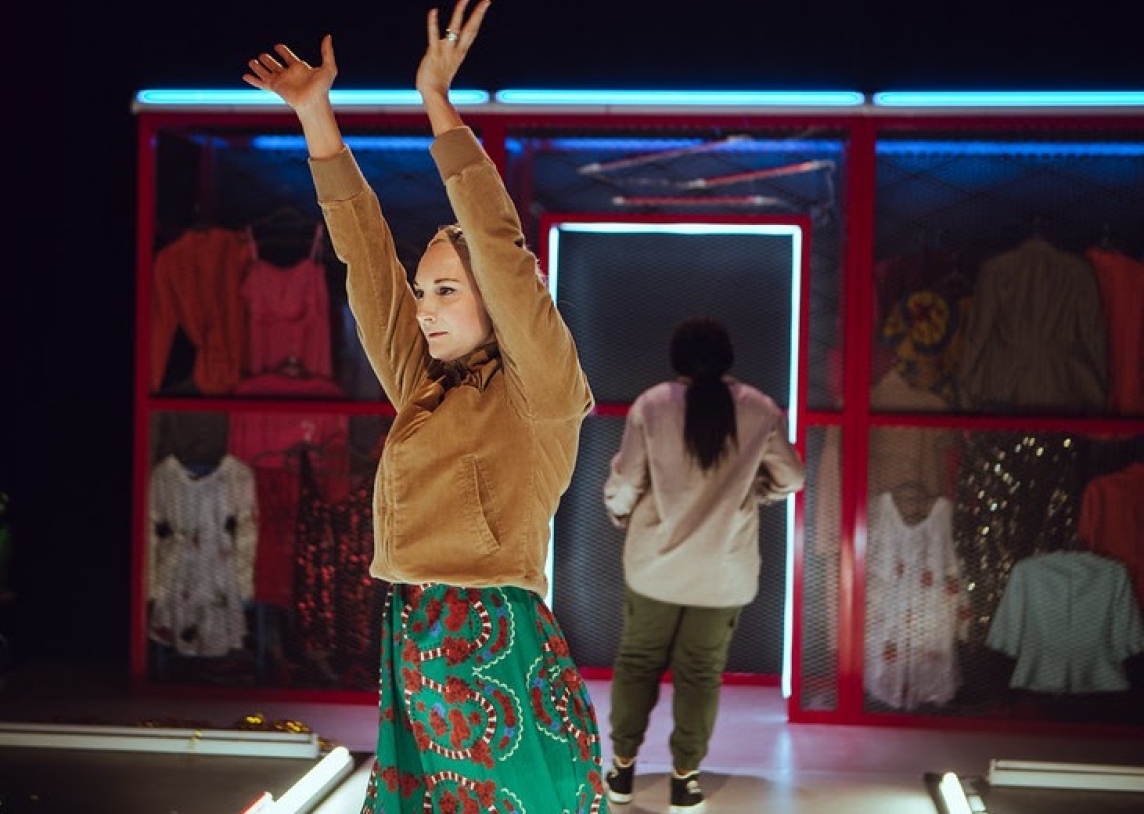News
Fault Lines
by Inesa Vėlavičiūtė
Known for developing bold intercultural dialogues in theatrical forms, Katherina Radeva and Alister Lownie from the award-winning performance art company Two Destination Language offer a fresh take on what it is like to be a woman in today’s world, expressed through costumes and characters in a line-up of different body shapes and ages parading a catwalk. The multifaceted performance invites audiences on a journey of unapologetic body acceptance, exploring the deeper meaning behind beauty, self-expression and its connection to identity and belonging.
The primary theme in this full-bodied conversation between the five women and the audience is celebrating a diverse range of female expressions and individualities. Clothes seen as a means of expressing varied female experiences are infused with simple and recognisable body movements, carrying a myriad of associations. Putting on formal jackets on aprons, or statement shirts cursing the toxic masculinity and encouraging female empowerment, striding in glitter heels or fashioning a late-night one-shoe wear to name but a few, the production illustrates personal stories behind these items, letting each to speak for themselves. Just as different pieces constitute the stage’s wardrobe, women wearing them express layers of personalities. The performance captures and expertly presents all kinds of clothing connections to the complex notion of identity, projected across all areas of a woman’s life: family & relationships, career, leisure, personal health and ownership of one’s body. Clothing thus becomes more than a stitched piece of fabric and takes on a symbolic meaning, portraying womanhood beyond the mere physical representation to intangible elements of who a person is.
The second keyword in this production is “choice”. It is such a strong element in the way the performance is conducted and is central to understanding what the artists represent both collectively and individually. The show offers a unique feature of multi-channel audio with soundtracks the audience can select from to accompany the non-verbal narration of the otherwise silent walk. This choice gives power in setting the parameters for their experience. The act of playing with clothes’ colours and textures is also an active and deliberate choice made by the performers, representing the power to experiment and create. In these creative decisions, the high-energy show reiterates the idea that we all live in our own reality and we have a choice to liberate ourselves from the self-imposed constraints and society’s manipulation, challenge gender and sexuality stereotypes as well as beauty biases. Cloaked in fabric, this show represents a novel way of advocating self-love: it invites the audience to stop relying on external validation and embrace every diverse feature of their outer and inner landscapes – the understanding of the self.
Although a great deal of interest in gender politics and body acceptance has resulted in greater discussions around this area, Fault Lines demonstrates that there is still a long way to go before the human body in all its guises is truly respected and celebrated. A feminist re-imagining of the fashion industry, this production reminds of the choice we all have when it comes to following or refusing the narrow and exclusive definition of beauty and signs of femininity.
This publication is written in the context of the project "European Contemporary Puppetry Critical Platform"

